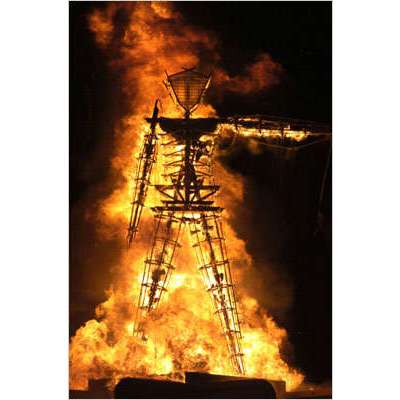My solution to the Burning Man ticket crisis

Unless you’ve been living under a (neon covered?) rock, you might have heard about the ticket crisis facing Burning Man. Because tickets sold out at the end of the cycle last year, the organizers were worried about their fair distribution this cycle. They set up a multi tiered system: first, they sold 3,000 tickets for $420, for those who were extremely concerned about a lottery and really wanted to guarantee having tickets. Then for the bulk of the tickets (40,000 of them) they instituted a lottery. Because they did not want to prejudice against those with limited computer access they kept the lottery open for several weeks and then selected randomly.
While it’s an understandable chain of reasoning that because they want to be most fair and a lottery is completely random, they should hold lottery, there were many issues and flaws. Because people weren’t assured of getting tickets, everyone registered for two instead of one (the average registration was for 1.7 tickets.) The demand, also, was far greater than even that multiplier would predict (I believe about one in four people got tickets.) One may be tempted to say “tough luck,” but when 3/4 of the people who actually made the larger camps happen are missing, this is a problem.
Another issue is that, in the very year when scarcity was an issue, this system has raised the pool of people who are considering going to Burning Man. Anyone who requested two tickets and doesn’t know someone who needs the extra is liable to offer the ticket to people who would not otherwise have bought one (especially because they wouldn’t get the cash for the ticket for several months if they waited.) While introducing new people to the event is great, this means that the tickets are in even higher demand as extras get taken by people who didn’t want them in the first place!
Scalping tickets is VERY MUCH against the Burning Man ethos (the ticket price is ideally only the bare minimum needed to produce the event, and to charge more for an event about love and the rejection of commerce is pretty awful. Discussion about the weirdness of a ticket price to such an event should take place elsewhere.) So the organizers created the STEP program, which allows people to offer their unused tickets up at face value, and opens in a week and a half.
The ticket fiasco does illustrate the fundamental problem of the Burning Man ethos – that as soon as a reality of plenty becomes a reality of scarcity, everything breaks down. But I think that it doesn’t have to be a reality of scarcity..just yet.
I think this system will solve all of the problems, and here’s how it works.
- For those who have gotten tickets, they have one month to assign names to those tickets. Any tickets not assigned names will be taken back and the credit card refunded. Yes, this will encourage scalping during this one month period – it’s a necessary evil.
- After this one month period, people will be charged a 25-30% fee to change the name on a ticket. However, selling the ticket back to Burning Man will incur only a 10% fee. Those fees would be used to pay for the extra costs Burning Man has had to incur.
- IDs will be checked at the gate.
What this system does is eliminate the artificial scarcity induced by hoarding..and then some. Of the around 100,000 tickets requested to the event, I would bet that only about 30,000 of those represent actual names of people. We would be back to the old system, where it would take at least several months before tickets would sell out. This allows people to buy tickets immediately and actually encourages advance planning, but doesn’t stop people from going at the last minute as small batches of tickets open up.
One response I’ve heard many times to this idea is that it would end the time-honored practice of gifting tickets (buying them for other people.) No it wouldn’t! Instead, you’d just buy at ticket for a person with a credit card.
There are some difficulties introduced in this process, all of them surmountable. Checking IDs at the gate might be difficult, but I am sure there are innovative solutions to this problem. And yes, some people don’t have IDs. Perhaps they can use photographs. And then there is the fact that tickets now reside on the internet; in other words, having a paper ticket does not necessarily guarantee that it is valid. Instead people would have a printout (or a mailed piece of paper) that reminds them that the ticket is not necessarily valid and validity can only be checked by calling a phone number, visiting a website, or scanning a barcode.
We’ve created a problem of artificial scarcity. One day Burning Man will have a permit for more than enough people, but with this system we can give ourselves at least three years of time without tickets selling out as the event begins to grow.
Thoughts?
